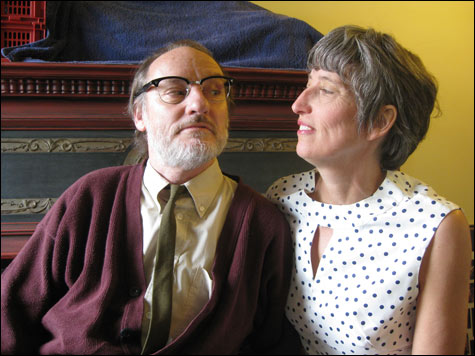
SORTING OUT WHO CARES Václav Havel’s search for relevance. |
In these days of ongoing revolution, many are drawn to look back to protest and uprisings of the past. One of the most vibrant and imaginative of 20th-century resistance movements was that against Communist Czechoslovakia during the late '60s, '70s, and '80s, when an array of artists (including the Zappa-inspired psychedelic band The Plastic People of the Universe) practiced creative opposition to the Soviet-bloc regime. Key in the protest was the banned poet and playwright Václav Havel, who was placed under house arrest in 1978 and the following year, because of his role in writing and defending the human-rights manifesto Charter 77, imprisoned for four and a half years. Later, after the 1989 Velvet Revolution, Havel would go on to become president of the Czech Republic and an internationally renowned writer and human rights advocate, but in the meantime he lived through years of Soviet-era oppression.
His play Largo Desolato, written just a few months after his release from prison, was later translated by master playwright (and fellow Czech native) Tom Stoppard, and is on stage now in a ravishingly smart production by Generic Theater at the Players' Ring. Largo Desolato explores a very specific and very personal consequence of life under totalitarian rule: Its harrowing effects on the prominent dissident writer. It's not just government threats and stooges that oppress its protagonist, philosophy professor Leopold Nettles (the excellent Roland Goodbody), but also the alternately epic and banal expectations of his proletariat public, fellow intellectuals, estranged wife, friends, lover, and students. In Havel's script, the question becomes: What are the role and responsibilities of the intellectual during times of oppression and crisis?
It's a serious question, but Havel's treatment of it is deliciously, blackly comic: All those who invade the home of poor Leopold, men and women alike, wear identical trench coats and fedoras. Their often absurdist lines of dialogue repeat, loop, skip like records, and are punctuated with humorously ominous riffs played live by a keyboardist (Adam MacDougall, magnificently sensitive and laconic). Leopold's besieged living room, in the three-quarter round of the Players' Ring theater, is ringed with slim metal bars, like a loose cage, and with bookshelves of spine upon spine bearing Nettles's name and titles. It's a superb manifestation of both Leopold's home and his mental space — prisons defined both by state threats and the legacy of his own work — as he paces, circles, has his personal space invaded, and takes clockwork-frequent shots of a handle bottle of rum.
As the increasingly beleaguered professor, the gray and bearded Goodbody wears a frumpy cardigan, widens his eyes in near-constant anxiety, and creates endless dunes of creases in his brow. But only in his face and slight, jumpy frame does he betray his anguish — he goes to excruciating pains to accommodate everyone, to remain pleasant and reasonable to an overwhelming array of demanding guests.